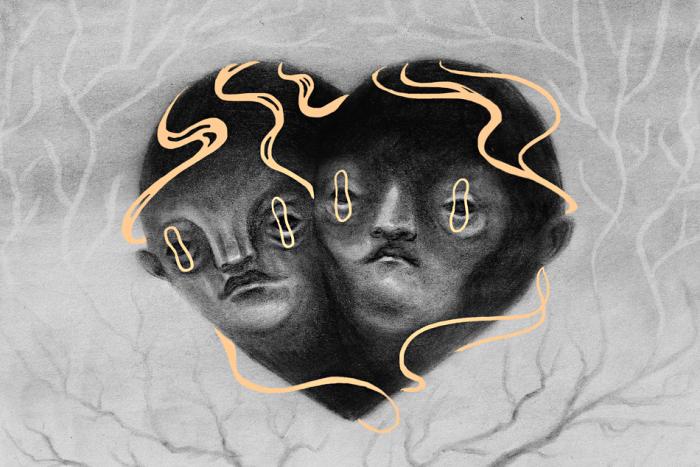Welcome to Wayward Watching, a column on the seen and unseen in film.
Two women are chatting in the lobby of an auditorium, minutes after an onstage interview in New York. “Do you find yourself overwhelmed by emotion when you are up there at the podium?” One says to the other. “Yes,” the older, more eminent woman replies. “Yes, that does happen.” The younger woman plays with her hair and looks longingly at her counterpart. “God, it must take hours to come back down to earth.” The famous woman is clearly flattered by the attention and—not for the first time, one suspects—sizes up this person so eager to please. She points to the expensive-looking handbag of the admirer, “That is a fantastic bag, by the way.” But just as their conversation is about to take a franker turn, they are interrupted by the older woman’s assistant: “Sorry, your lunch with Mr. Kaplan.” The older woman apologizes before taking her leave. The fan asks, with a knowing smile on her lips, if they can text each other. Later, the older woman is in Berlin, having returned home from the airport to her wife and daughter. The wife can’t help noticing that her partner has a new handbag.
Lydia, the protagonist of Todd Field’s Tár, clearly gets off on the power she wields in a room, the eagerness with which younger women are always asking if they can text her, or gifting her their handbags. In the opening scene, the New Yorker writer Adam Gopnik reads aloud her Wikipedia page from a podium—she is, among other things, the first female conductor of the Berlin Philharmonic—and they exchange wisecracks for the next twenty minutes on the evolving role of the conductor in an orchestra, the importance of time in a composition. Finally, I thought, the first time I sat through the scene: finally, a movie for those who listen compulsively to podcasts. Lydia’s assistant, Francesca, has the face of a woman who has never once raised her voice. Her wife, Sharon, the first violinist in the Berlin Philharmonic, is also incredibly naïve. After all these years of marriage, she doesn’t seem to have caught on that Lydia frequently steals her anti-anxiety pills, or the fact that Lydia’s rich male friend, the aforementioned Mr. Kaplan, isn’t the one gifting her those handbags.
What struck me about the movie is that the director Todd Field isn’t scared of leaving things out, trusting the audience to infer the story from disparate details. The scenic counterpart to Lydia’s tête-à-tête with Gopnik is a later moment when we see her teary-eyed, watching an old tape of Leonard Bernstein in the basement of her parents’ house. By then, we’ve seen her struggle to cover up accusations of having inappropriate relationships with younger colleagues and manipulating their career prospects. We’ve seen her prey on a new member of the orchestra and plot to have her long-time assistant conductor replaced. Inside her parents’ basement, we witness Lydia overwhelmed by emotion, no doubt recalling the days when she’d been a young hopeful twentysomething herself, still becoming. You realize that Linda Tarr didn’t just change her name and become a celebrity conductor, but that her story is also a version of the Horatio Alger myth. As Gopnik pointed out in a recent Esquire article, Lydia was born too late to have been mentored by Bernstein. The fact that she has escaped scrutiny about her background so far suggests that the mythmaking is perhaps de rigueur in the world of classical music.
Indeed, the film fails to impress at precisely those points where Field seems too plugged in to aspects of contemporary discourse. We don’t quite see Lydia being hounded after the allegations are published online. We only glimpse the repercussions, and the logic of her downfall feels too literal. The emphasis on one person’s monstrous behaviour cloaks a deeper rot: the systemic coddling of the temperamental artist. One wonders where young Linda Tarr picked up the rules of the game. The male composers she hangs out with are either dwindling fossils or cartoonishly incompetent. In the middle of an argument, Sharon hints that their relationship, too, had initially been a chess move on Lydia’s part, that marrying the first violinist—who also happens to be a native German speaker—was perhaps a way for Lydia to assert her authority over the orchestra. But where are the men from whom Lydia presumably imbibed these toxic traits? Her brother is a benign presence, just about appearing in one scene. The outgoing assistant conductor is fusty, unambitious: he lashes out at Lydia after his unceremonious exit before disappearing for the rest of the movie.
When James Joyce’s landmark collection of stories, Dubliners, was published in 1914, the poet Ezra Pound praised the book for being careful to avoid “telling a lot of things that the reader didn’t want to know.” Field seems to have left out the bits the viewer would want to know. Is Lydia’s relationship to music sacred, for instance, or is that too a part of her power grab and need for social accomplishment? Does she really care about redeeming Bach and the other old masters she defends during a guest lecture at Juilliard, or is the deference to history also something she learned from the men who preceded her? During the interview with Gopnik, she throws around highfalutin abstractions about making the metronome tick in every performance. Later she lies to her assistant about needing to work on her version of Mahler’s Symphony No.5, while actually planning to meet the woman with the handbag. The appearance of a black dog at one point was reason enough for multiple critics to compare the movie to Andrei Tarkovsky’s Stalker, but that’s akin to calling a random photograph of an insect Kafkaesque, or a stray scene in an Irish pub Joycean.
Field doesn’t delve deep enough into Lydia’s viewpoint for Tár to work as a commentary on cancel culture. As a work of art, on the other hand, the film isn’t elusive enough, often failing to generate images that capture its themes. (The exception, of course, is Lydia being haunted by sounds of multiple women screaming each time she steps out for a run in the neighbourhood park, an instantly iconic moment.) By muting the story of the former student who committed suicide after Lydia badmouthed her to potential employers, Field might be indicating that the maestro probably forgot her sins—muted them in her head, so to speak—but then again, we aren’t privy to what Lydia truly thinks or feels about anyone, just the imposing pull she exerts on those in her orbit. If Lydia can observe her wife yielding to her instructions during rehearsal sessions, surely she can recall the exact nature of the damage she inflicted on a protégée. “She thinks she is being ironic,” Lydia’s assistant texts someone early in the film. You could say something similar about Field’s intentions in the movie, his sloppy gestures of ambiguity.






